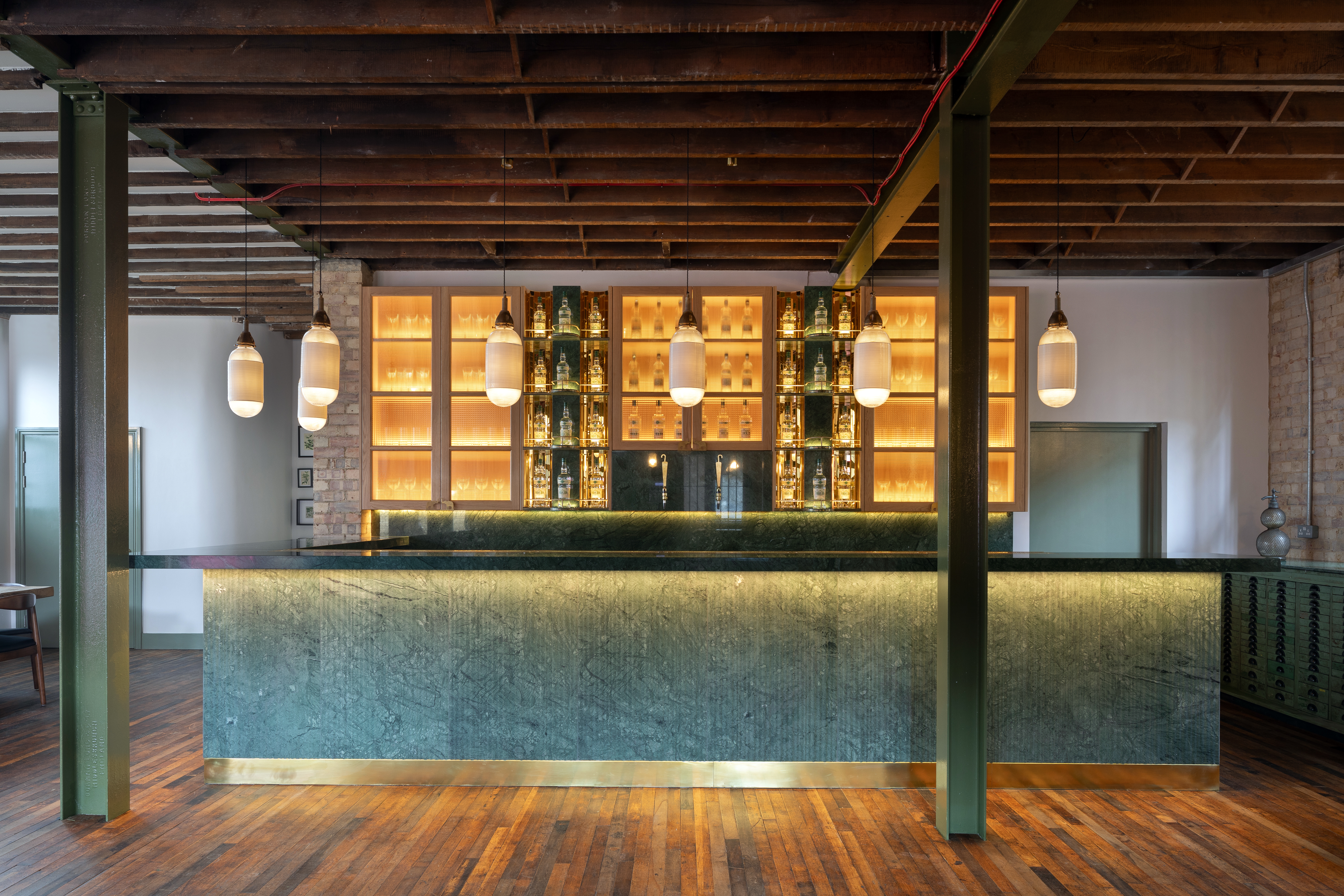
The new home of Thames Distillers, the 11th-generation, family-led company of gin makers, is tucked away within a cobble-stoned, period industrial complex off London’s Old Kent Road. While at first glance, the business’s new setting might seem utilitarian and unassuming, it is one steeped in a history of making, trade and crafts, sitting in a part of the capital that has, in the past, teemed with production facilities, due to its proximity to global trade routes via the former Grand Surrey Canal.

Thames Distillers' new home and bar
Comprising a new distillery and client experience, the project forms part of a fresh chapter for the area, formerly a Victorian warehouse district. The distillery is set within The Bottle Factory, a campus recently revitalised by property specialist Fabrix as a creative workspace, event and production hub.
Having once served as a mineral water, lemonade and ginger beer bottling plant, the building is located next to an old essence company creating bitters and mixers. Continuing this tradition in drink-making of all kinds, Thames Distillers turned to Transit Studio and its founder, Zoe Masterton-Smith, to help transform the existing historical structure into a modern production facility and event space, when the thriving business was forced to relocate following the sale of its previous base in Clapham.

Director Charles Maxwell and his family have been distilling in London since 1681, making it one of the oldest family distillers in the UK and one of very few truly commercial distilleries left in the capital. Thames Distillers has created over 300 gins, and in any given year it distils over three million bottles of gin across as many as 60 different recipes.
‘As drinks and spirits today are more experiential than ever before, we wanted a new home that reflects that, practical but also full of character,’ says George Maxwell, Charles’ son and COO.

The new home on Old Kent Road was born of this desire. Its unmistakable centrepiece is a state-of-the-art bar, commissioned alongside one of Thames Distillers’ clients, Fords Gin. ‘When [Fords] heard we were moving, they wanted to jointly create a space where they can showcase their heritage. And we will be using it for our events too – and even for hire,’ says Maxwell.

‘The layout of the bar is the result of a collaboration between Leo Robitschek (cocktail royalty from NoMad Hotels and Eleven Madison Park, among others) and Fords Gin,’ explains Masterton-Smith. ‘The bar is ergonomically designed around a central, shared spirit and modifier well [a specialised storage space for the drinks], where the two cocktail stations are left and right-oriented. The bar is arranged for an economy of movement so that for each cocktail created, the bartender does not have to take more than one step.’

Echoing the gin-making business’ love for British craft, the bar is wrapped in deep green marble with a fluted marble bar front, oak and reeded glass, and features bar lights reminiscent of soda siphons made from Holophane glass and porcelain. The space includes floorboards reclaimed from a former timber mill in Bristol; a mix of contemporary and vintage furniture pieces (including a dining table made from reclaimed timbers and midcentury furniture pieces such as Børge Mogensen & Tage Poulsen sofas); and an antique shop display unit for the distillery’s archive of 2,000 gins recipes they have created over their three centuries of operation.

Next to the bar and event space are Thames Distillers’ most precious possessions – Tom Thumb and Thumbelina, surprisingly small stills that have belonged to the business since the early 1990s. While the bar is the site’s most public-facing section, they are an integral part of the company’s new home, ensuring the long-standing business can keep producing its popular spirit for centuries to come.







